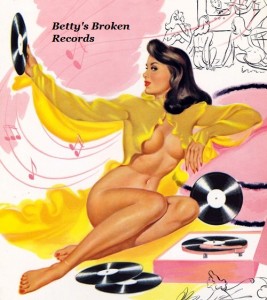 Hey y’all! Music City is one of the greatest hubs of creativity in the World, not just for the music for which the city gained its nickname from but for artists of every cree. The Record Shop is very excited to get to share some of the great local talent that Nashville has to offer. We had the privilege of chatting with Cari Gray, a local artist who specializes in hand-carved, vinyl record sculptures. A native of Tallahassee, Florida, Cari moved to Nashville back in 2005 to complete her degree in the Music Business from MTSU, and currently works at Sony Music Nashville. The Record Shop first met Cari a few weeks ago at the Tomato Art Festival in East Nashville. Our Master in Chief, Sean Giovanni, saw a piece Cari had carved in the shape of his home state Michigan that now proudly hangs in the confines of our Nashville Recording Studio.
Hey y’all! Music City is one of the greatest hubs of creativity in the World, not just for the music for which the city gained its nickname from but for artists of every cree. The Record Shop is very excited to get to share some of the great local talent that Nashville has to offer. We had the privilege of chatting with Cari Gray, a local artist who specializes in hand-carved, vinyl record sculptures. A native of Tallahassee, Florida, Cari moved to Nashville back in 2005 to complete her degree in the Music Business from MTSU, and currently works at Sony Music Nashville. The Record Shop first met Cari a few weeks ago at the Tomato Art Festival in East Nashville. Our Master in Chief, Sean Giovanni, saw a piece Cari had carved in the shape of his home state Michigan that now proudly hangs in the confines of our Nashville Recording Studio.
The Record Shop: How long have you been an artist? What got you started?
Cari Gray: I have always been pretty creative and crafty and I would rather be doing something productive than watching tv or reading a book. Unless it’s shark week. Then all bets are off. I just started cutting records this past December; I’ve made record bowls and bracelets out of vinyl in the past but never just cut one up. 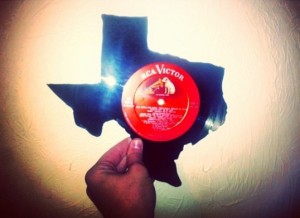 I made the state of Texas for a girl at work and it turned out pretty good. She put it up at her desk and before I knew it 10 other co-workers wanted their home states cut. Tomatofest was the first time I displayed my records and it was a blast and was super successful. It’s nice being appreciated for your work, especially when you just fall into it like I did.
I made the state of Texas for a girl at work and it turned out pretty good. She put it up at her desk and before I knew it 10 other co-workers wanted their home states cut. Tomatofest was the first time I displayed my records and it was a blast and was super successful. It’s nice being appreciated for your work, especially when you just fall into it like I did.
RS: Who are some of your biggest inspirations?
CG: I like all kinds of art and there are so many talented people in Nashville. But I don’t know anyone who hand cuts records like I do. I’ve heard of people laser cutting records because people always ask me if I do, but every record is different because they are hand cut. And, I honestly wouldn’t know what to do with a laser anyhow.
RS: Do you spare certain, special records from becoming pieces, or are they all fair game?
CG: Everything is fair game. I try to match the state with the artist or a track on the record as best as I can. For instance, if I cut a Texas record I would try to find an artist from there like Willie Nelson.
RS: Do you remember the first record you carved?
CG: I don’t remember which artist was on the first record I cut. I know it was an RCA Victor record though, and we work for RCA. So, that’s why I chose that one.
RS: How do you decide on what to carve out of a record?
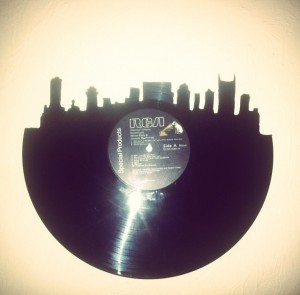 CG: I like to cut states out of the records because I feel like most people that I’ve met here aren’t from Nashville so people like to represent their home state. I know I do. But, that’s the great thing about Nashville. Artists come from all over for music and whatever else. I was a 20 year old once who moved up here to be a singer too, like a lot of other people.
CG: I like to cut states out of the records because I feel like most people that I’ve met here aren’t from Nashville so people like to represent their home state. I know I do. But, that’s the great thing about Nashville. Artists come from all over for music and whatever else. I was a 20 year old once who moved up here to be a singer too, like a lot of other people.
I also like to cut out random silhouettes, animals, and musical artists. I love Michael Jackson so I’ve cut a few out of him. I honestly just cut out whatever I like. It could be a unicorn if that’s the way I’m feeling that day. I just google whatever I want and try to find an outline for it, and if I can’t Find what I want I just free hand draw it.
RS: What records have you playing, instead of carving?
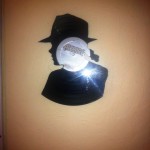 CG: I listen to all kinds of music, literally. I work in country music, but my husband [Jeff Shields] is the lead singer of two rock bands (Stereoside and Stone Glory) so I listen to his stuff a lot also. So if I finish something cool, I go in the music room to make sure he thinks it’s just as cool because I am so new at this whole record cutting thing. Then I return to the craft room with my safety glasses covered in vinyl dust. So it works out pretty well. I have a good collection of vinyl, mostly rock n’ roll, Sam Cooke and Michael Jackson. Lately, I’ve been listening to The Wild Feathers and a lot of other local bands. We are so spoiled here in nashville.
CG: I listen to all kinds of music, literally. I work in country music, but my husband [Jeff Shields] is the lead singer of two rock bands (Stereoside and Stone Glory) so I listen to his stuff a lot also. So if I finish something cool, I go in the music room to make sure he thinks it’s just as cool because I am so new at this whole record cutting thing. Then I return to the craft room with my safety glasses covered in vinyl dust. So it works out pretty well. I have a good collection of vinyl, mostly rock n’ roll, Sam Cooke and Michael Jackson. Lately, I’ve been listening to The Wild Feathers and a lot of other local bands. We are so spoiled here in nashville.
Spoiled indeed. Nashville is a truly remarkable town full of incredibly talented artists like Carilyn Gray. If you like Cari’s work as much as we do, and how could you not, you can click HERE to go to her website where you can view and purchase her work!
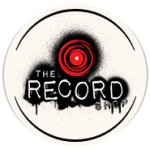
Thank you for spending some time with us here in The Record Shop! Be sure to follow and chat with us on Twitter, @therecordshop, for daily updates from Gio & the Henchmen. We’ll see you next time!
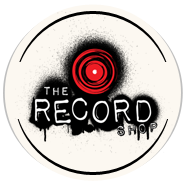
How to Achieve Outstanding Mixes with Drum Recordings
The beat is the core of any great mix. If the drums are not on point your mix will be off kilter from the start. Oh, it will sound okay, and many undiscerning people will probably not notice but for the true aficionado will. This is the first in a series of posts designed to help you get the most out of the Nashville recording studio and your Nashville drummer.
Drums and Microphones
While there are several ways to do this I find that these 5 things help you to capture the best possible sound. Getting that recording perfectly starts with how you mic up a drum kit. Follow these drum recording tips and you will wow everyone with your mix quality. There are two basics when recording drums (a) using the overheads and supporting this with a close mic or (b) build the kit using individual mics and saving the overheads for cymbals only.
Most experts say that drums are the most challenging instrument in a recording drum studio. To get the best sound it is best to use multiple mics and for ultimate effects in your Nashville drum recording make sure the drums compliments the song whether instrumental or vocal.
That’s all for today kiddies, but do come again for another lesson on making great mixes with drums.
Best Practices for Recording Vocals
Recording vocals is no easy task, and since vocals are one of the most important components of any track, it is important that it is done right. One of the biggest advantages of availing the services of a recording studio is that they have the right equipment and enough expertise to ensure that the vocals are recorded optimally. Here are some of the best practices for recording vocals.
advantages of availing the services of a recording studio is that they have the right equipment and enough expertise to ensure that the vocals are recorded optimally. Here are some of the best practices for recording vocals.
Choosing the right microphone
You will generally have three types of microphones to choose from as a vocalist. The large diaphragm condenser microphone is a popular choice since it is able to capture the loudest and softest sounds with unparalleled clarity. Alternatively, you can pick a dynamic microphone, which is ideal for loud singers who their voice to create an impact. The third option is a ribbon microphone, which are great for bright or harsh sounding voices that are in need of slight mellowing.
Getting the visual sightlines perfect
Although this is not entirely necessary, it is useful to maintain eye contact with the control room while you are singing. Since the professionals in the control room are going to be watching you, you might as well seek reassurance and emotional feedback from them while you, as the artist, are recording your vocals.
Finding the ideal position for the microphone
It doesn’t matter how good a microphone you have to record your vocals with – it must be positioned properly. This is where professional recording studio technicians can come in handy, since they generally know the distances and angles that work. Trial and error is normally needed though, since no two singers get the best results at exactly the same distances and angles.
Wearing headphones
The importance of wearing good-quality headphones while recording vocals is often understated. Artists should ensure that both their ears are covered with phone cushions so that spill is eliminated altogether. It is equally necessary that the headphones are hooked onto a powerful amp and that they fit perfectly.
At the Record Shop, we make sure that vocalists are briefed about and guided through the best practices for recording vocals. What do you think is the most important thing a singer should keep in mind while in the recording studio? Let us know in the comments section!
Drum Recording Techniques and Secrets
The drum-kit is perhaps the most frustrating and time-consuming instrument in terms of recording. If you manage to get it right, the rewards are significant because everyone knows that the core of a fantastic mix is a great drum sound. We have compiled four important drum recording techniques and secrets that we think could help you deal with the challenge of drum recording.
everyone knows that the core of a fantastic mix is a great drum sound. We have compiled four important drum recording techniques and secrets that we think could help you deal with the challenge of drum recording.
Tune the kit
It’s quite unsettling how many people forget to tune their kits before they start drum recording. No drum can produce its optimal sounds unless it has been properly tuned. The skins must be neither too tight nor too slack, and the tension should be even too.
Get your overheads right
It is useful to put a stereo pair in place to check out how the kit sounds and make sure everything is balanced. It is important that you hit the toms with the right intensity and the cymbals with the right frequency so you should fine tune your drumming skills before you even think about getting your overheards right.
Set the mics steep and close
Not everyone agrees on this, but it is often extremely effective to set the mics straight down into the drums at a steep angle of approximately 70 degrees. This way the mics will be able to capture maximum body and weight to the sound. Move the mic around the drum head marginally if you’re not getting your desired results until you find the right spot.
Tune the recording space
Much is often spoken about the importance of tuning instruments, but people often forget that recording spaces also need to be fine-tuned for an optimal result. If the room where you are planning to record your drum has carpeted floors and walls, make sure you make arrangements for some reflective surface such as plywood sheets to place on the walls.
If you want to know more about our drum recording services, visit our Drum Recording page today. What are your drum recording techniques and secrets? Get involved in the discussion below!
Live Concert Recording Tips
Let’s talk about Live Concert Recording Tips
The live music versus recorded music debate has lived on for a long period of time and has no real end in sight. One answer leaves both sides happy – live concert recording. If done properly, live concert recording can balance the feel of being at a concert with the quality that is normally associated with high-quality recordings produced at Nashville recording studios.
The challenges of live concert recording
It’s not easy recording live concerts for a number of reasons. The biggest problem that recording studios face is that they only have one shot to get it right. You can’t ask a vocalist to repeat the lyrics while they are on stage performing in front of a live audience in case you didn’t capture them well enough.
Besides that, Nashville recording studios have to transfer expensive recording equipment to the concert venue. It’s really important to take more equipment than you think you need, because you always need to be prepared for the worst when performing live concert recording.
How to create a great live record
It’s very important to know the venue inside out before you actually go to the concert itself. Ideally, you should have a good idea about the band whose performance you are going to be recording so that you know how many musicians there are as well as what their specific roles and needs are.
It is important to set conservative levels too, since unlike in a recording studio environment, at a live concert, musicians tend to play or sing slightly louder than they planned to, or not quite as loud as they had in the trial session. If you have input conservative settings into your recording software, you won’t have to worry about spending forever editing the video to make it acceptable to your clients.
Most Nashville recording studios don’t actually offer live concert recording services, but The Record Shop has a number of packages that are designed for clients with different needs. Check them out and get in touch if you are interested in seeking our assistance for live concert recording.
Deciding Whether Your Album Needs Mastering
In an increasingly complicated world of music, musicians have to make lots of decisions. When you are new to it all, it can be overwhelming. One such choice you have to make is deciding whether your album needs mastering. We at The Record Shop strongly believe in the power of mastering music.
make is deciding whether your album needs mastering. We at The Record Shop strongly believe in the power of mastering music.
What exactly is mastering?
People throw around the word mastering, quite frequently not quite knowing what it actually means. Mastering is the process by which recorded audio is prepared and transferred from a source to the master, i.e. a data storage device. Mastering is not a particularly simple process. It entails a number of different processes, including EQ, limiting, noise reduction, compression and stereo-widening.
Can mastering improve your recordings?
Mastering should always be the last thing on your mind when you are looking to record music. Your main focus should be on getting great records and mixing them carefully. Mastering doesn’t make or break a record the same way the recording and mixing processes do.
Why do people master their records then?
Even if it may not make or break a music recording, mastering processes are extremely popular these days. There are several benefits associated with mastering that some people continue to overlook.
Mastering is done by audio engineers, and if you go to a professional Nashville recording studio like The Record Shop, you can rest assured that a competent fresh set of ears will be finalizing your album. During the mastering process, you can have an objective and qualified person judge whether your EQ balance is actually perfect, or that there isn’t too much noise in your track.
It is human nature to get excited when you’re at the penultimate stages of a big project. Those musicians who are releasing their first album might attempt to speed up its completion so that they can release it and see the response they get. Opting to go to a professional Nashville recording studio for mastering your audio will mean that you will have a finished product that is worth bragging about.
How important do you think mastering your album is? Let us know on Twitter or in the comments section below.
Cari Gray: Featured Artist
The Record Shop: How long have you been an artist? What got you started?
Cari Gray: I have always been pretty creative and crafty and I would rather be doing something productive than watching tv or reading a book. Unless it’s shark week. Then all bets are off. I just started cutting records this past December; I’ve made record bowls and bracelets out of vinyl in the past but never just cut one up. I made the state of Texas for a girl at work and it turned out pretty good. She put it up at her desk and before I knew it 10 other co-workers wanted their home states cut. Tomatofest was the first time I displayed my records and it was a blast and was super successful. It’s nice being appreciated for your work, especially when you just fall into it like I did.
I made the state of Texas for a girl at work and it turned out pretty good. She put it up at her desk and before I knew it 10 other co-workers wanted their home states cut. Tomatofest was the first time I displayed my records and it was a blast and was super successful. It’s nice being appreciated for your work, especially when you just fall into it like I did.
RS: Who are some of your biggest inspirations?
CG: I like all kinds of art and there are so many talented people in Nashville. But I don’t know anyone who hand cuts records like I do. I’ve heard of people laser cutting records because people always ask me if I do, but every record is different because they are hand cut. And, I honestly wouldn’t know what to do with a laser anyhow.
RS: Do you spare certain, special records from becoming pieces, or are they all fair game?
CG: Everything is fair game. I try to match the state with the artist or a track on the record as best as I can. For instance, if I cut a Texas record I would try to find an artist from there like Willie Nelson.
RS: Do you remember the first record you carved?
CG: I don’t remember which artist was on the first record I cut. I know it was an RCA Victor record though, and we work for RCA. So, that’s why I chose that one.
RS: How do you decide on what to carve out of a record?
I also like to cut out random silhouettes, animals, and musical artists. I love Michael Jackson so I’ve cut a few out of him. I honestly just cut out whatever I like. It could be a unicorn if that’s the way I’m feeling that day. I just google whatever I want and try to find an outline for it, and if I can’t Find what I want I just free hand draw it.
RS: What records have you playing, instead of carving?
Spoiled indeed. Nashville is a truly remarkable town full of incredibly talented artists like Carilyn Gray. If you like Cari’s work as much as we do, and how could you not, you can click HERE to go to her website where you can view and purchase her work!
Thank you for spending some time with us here in The Record Shop! Be sure to follow and chat with us on Twitter, @therecordshop, for daily updates from Gio & the Henchmen. We’ll see you next time!
The Importance of Pre-Production
Let’s discuss The Importance of Pre-Production
Recording music is a great experience, and it is no surprise that it gets even the most experienced musicians excited. If you are interested in making fantastic music, though, you should take a deep breath and remember that rushing into the recording studio is not always the best idea. You should devote ample time to pre-production, which is perhaps one of the most important parts of the recording process.
though, you should take a deep breath and remember that rushing into the recording studio is not always the best idea. You should devote ample time to pre-production, which is perhaps one of the most important parts of the recording process.
What is pre-production?
Before we get into the merits of pre-production, it is important to understand what exactly it is. Pre-production is the crucial planning stage of the recording process. It entails taking a song in its most basic form and working out how you plan on recording music around it. In pre-production, you have to figure out important things relating to the arrangement and composition of your music, such as how many measures there should be between the verse and the chorus.
What does pre-production entail?
Pre-production can entail a number of things. Experienced recording studios know exactly what needs to be done before the recording process can begin. The first thing you should do is determine a tempo for your song. There are various approaches that you may opt for with regards to the tempo of your song. If you are unsure about this, you should consult the recording studio you are planning to record at for some guidance.
Once you have decided a tempo for your song, you should create labels to divide your song into different sections. Most recording software have a marking system, so if you have access to one, figure out the arrangement of your song and mark the different sections.
If you really want to be thorough, you can even ask your recording studio to help you record scratch tracks. These are quick and completely basic recordings of your music that can be extremely useful as guidelines later on in the record production process.
Why is pre-production essential?
Well, pre-production isn’t essential, per se, but it can go a long way in improving the quality of your recording. It helps you create a map that you can constantly refer to every time you run into a stumbling block during the record production process..
Now that we’ve discussed the Importance of Pre-Production, What do you think is the biggest advantage of pre-production? Let us know in the comments section!
Getting the Most out of your Vocal Sessions
Getting the most out of your vocal sessions is essential. If you are working on your first record, the process is likely to hit at least a few road bumps if you haven’t done your homework. Here at The Record Shop, we make sure we handle all Record Production to enhance your vocal session experience. Here are some tips on what you can do to get the most out of your vocal sessions.
your homework. Here at The Record Shop, we make sure we handle all Record Production to enhance your vocal session experience. Here are some tips on what you can do to get the most out of your vocal sessions.
Learn the song in advance
Lyricists may continue making changes to their songs minutes before they begin their vocal session, but if you have your song ready, it helps if the vocalist is familiar with the song in advance. Not only does it save a lot of time if the vocalist knows the lyrics by heart, but the quality of the recording will also come out better. If you don’t know a song, you may end up constantly moving your head to look to and away from the lyrics sheet and not end up singing into the microphone element.
Practice before your vocal session
Remember not to take practice sessions too seriously, especially if you’re not actually practicing in the recording studio. No two venues are the same, so the acoustics are going to vary. However, what you should focus on is the melodic range so that you know you are able to hit all the right notes, as high or low as they may be.
Avoid dehydrating agents
How frustrating would it be if you spent a good dollar on a vocal session at a recording studio only to have to sing with a notably dry throat? Very. That is why it is so important that you avoid any food and drinks that dehydrate your throat at least six hours before your appointment. A dry throat may prevent you from hitting the right notes in your vocal session.
Those are just some things you should handle on your end. We can help you out with all the technical aspects of vocal sessions at The Record Shop Nashville. Just leave us a message and we will do everything we can to make your vocal sessions perfect.
Windows Apps for Musicians
Windows Phones are becoming more and more popular, especially among budding musicians. Having the right apps on your phone can make it easier to record music no matter where you are. There are several useful apps that one can download that will help with editing, tuning and writing music.
SEQUENCER
Sequencer is a powerful music tool that is useful for anyone looking to record music. It comes with several samples, customizable synthesizer wavetables and 7-channel mixing are just some of the features that make this app one of the most robust Windows apps for musicians. It’s most common use, however, is simply to create smooth drum loops. This app is free of cost.
SOUNDFLAKE SYNTH
If you want an app that lets you create loops very easily, SoundFlake Synth is worth a download. Although you can’t save sequences, it’s great fun playing around with the block and seeing just what you can create. This app costs $0.99
GUITAR CHORDS
Guitar Chords is a useful reference app since it gives you easy access to both standard and not-so-standard chords. It’s fairly easy to use. This app is free to download.
ACCURATE TUNER
Accurate Tuner is fantastic for tuning 126 different instruments. Whether you play a guitar or a hammered dulcimer, Accurate Tuner will make tuning your instrument extremely easy. You can choose between a free version and a paid version $2.99, which comes with a tone generator.
ONENOTE
How frustrating is it when you have a brilliant idea for a song but don’t know quite where to write it down? ONENOTE, which comes preinstalled in Windows Phones, gives lyricists the opportunity to create a note specifically to write ideas about songs in. You can pin the note to your Home page and start recording moments of inspiration before they escape your mind.
Do you own a Windows Phone? Which Windows apps do you use for your music needs? Let us know in the comments section!
Understanding the History of Recording Studios
Here is a brief about Understanding the History of Recording Studios.
People didn’t always have recording studios where they could go to help realize their music dreams. Yet, over time, as technology continued to develop and people saw a use for being able to record and playback sounds, recording studios began to emerge. Today, they are an integral part of the global music scene. In this article, we will walk you through a brief history of recording studios as they stand today in modern day America.
The idea of recording music first originated when Thomas Edison invented the phonograph in order to improve the quality of the telephone in the late 1800s. It consisted primarily of cylinders made of foil and was able to record sounds. Soon after, Emile Berliner invented a way to mass-produce recorded discs, which paved the way for great artists to go and have their work recorded.
By 1889, boxes with the ability to reproduce recorded sounds were invented and within the next year, the first recording studio was set up called the New York Phonograph Company. Within the next two decades, several recording studios had popped up that were producing records on wax discs. By the early twentieth century, the hand-cranked Victrola was replaced by the triode, which completely revolutionized the scale at which recording studios could now operate.
Once electronically recorded music became the next big thing, Western Electric came around the corner and began to use amplifiers and microphones for recording purposes. This was a massive change in the history of recording studios since before the use of this equipment, the people making music would have to sit very close together and even closer to the equipment, making for an uncomfortable recording experience.
In the mid-1900s, the recording industry started to use magnetic recording tapes, which meant that recordings could finally be edited. Soon after this development, multi-track recorders emerged, allowing audio engineers to mix different tracks recorded at different times. Of course, now we are in the digital age where much of the recording process is done on computers and the possibilities are quite literally endless.
There’s a whole lot that happened in between all these big inventions that shaped the way we record our music today. When did you first visit a recording studio? Was it before the digital age?
And that concludes Understanding the History of Recording Studios.
Share your experiences with us on Twitter @therecordshop